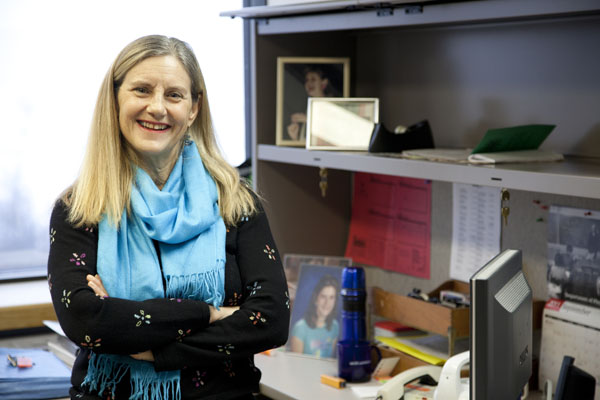Carleton releases national study on the work-life experiences of employed caregivers
A major Canadian study by Carleton University’s Linda Duxbury and Christopher Higgins at Western University, prepared in partnership with Desjardins Insurance, has found that an increasing number of employees are providing care for children, elderly parents or both, and that they need more support from employers and governments. One of the strengths of this report is that is provides concrete recommendations to employers who are interested in how best to address this critical issue.
“Canadians are delaying parenting and are more likely to have both younger children and older parents,’’ said Duxbury. “Canadian companies must start addressing the needs of these employees if they want to attract and retain talent. Support for these caregivers must be considered a business imperative.”
The study examined the work-life experiences in 2011-2012 of more than 25,000 Canadians, mostly highly-educated managers and professionals at larger firms. The study included an in-depth survey of 8,000 caregivers and 111 follow-up interviews to get the most up-to-date information on this critical topic.
”Professors Duxbury and Higgins are renowned experts in this field, and the scale and scope of this study give us a much deeper understanding of what our plan members really need,” said Jean-François Chalifoux, Senior Vice-President, Group Business Insurance with Desjardins Insurance. ”It will help us develop services that take the needs of caregiving employees into account, which, in turn, will help our clients manage their healthcare costs.”
Among the study’s findings:
- Up to 35 per cent of the 25,021 employees surveyed were balancing work with caregiving and/or childcare.
- Men were increasingly involved in caregiving roles.
- Decline in family sizes means there are fewer family members to help.
- Ninety per cent of employees viewed caregiving as a family responsibility; 83 per cent chose to take on the responsibility.
- Caregivers were coping by bringing work home, giving up sleep, personal time and their social lives.
- Balancing work and caregiving significantly increases the likelihood employees will be absent, use company benefits, turn down a promotion, be less productive and work fewer hours.
”An organization’s bottom line will be impacted if real support is not given to caregivers, especially those caring for both young children and elderly parents –“sandwich” caregivers,” said Duxbury. ”They reported the lowest levels of perceived health and very high levels of stress and depressed mood overall – the highest we observed in our sample of 25,000 employed Canadians.”
Employees in the sandwich group were evenly split between generation Xers and baby boomers, dispelling the myth that older employees are mostly likely to be caregivers.
- The study recommends that employers provide:
- Flexible work arrangements to address time-consuming health and daily-living assistance.
- Expanded Employee Assistance Programs (EAPs) and Employee and Family Assistance Programs (EFAPs) to help employees cope with the need to provide emotionally-taxing support to aging family members.
- Training to communicate the importance of this issue to management.
- Seminars for employees to help them manage the emotional strain of caregiving.
- Paid and unpaid leaves of absence.
- Caregiver support networks in the workplace.
- Crisis and project management training.
“People can chose whether or not to have children but they cannot chose whether or not to have parents,” says Duxbury. “We urgently need to redefine work-life issues to include not just working parents but employees who are caring for loved ones in the end stages of their life.”
A copy of the study can be found here:
About Carleton University:
Located in the nation’s capital, Carleton University is a dynamic research and teaching institution with a tradition of leading change. Its internationally recognized faculty, staff and researchers provide more than 25,000 full- and part-time students from every province and more than 100 countries around the world with academic opportunities in more than 65 programs of study, including public affairs, journalism, film studies, engineering, high technology, and international studies. Carleton’s creative, interdisciplinary and international approach to research has led to many significant discoveries and creative works in science and technology, business, governance, public policy and the arts. As an innovative institution Carleton is uniquely committed to developing solutions to real-world problems by pushing the boundaries of knowledge and understanding daily.
About Desjardins Insurance:
Desjardins Insurance has been offering a wide range of life and health insurance and retirement savings products to individuals, groups and businesses for more than a century. As one of Canada’s five largest life insurers, they oversee the financial security of over five million Canadians from offices across the country. Desjardins Insurance is part of Desjardins Group, the country’s leading cooperative financial group. Desjardins Insurance refers to Desjardins Financial Security Life Assurance Company.
Media Contact:
[one_half]
Steven Reid
Media Relations Officer
Carleton University
(613) 520-2600, ext. 8718
(613) 240-3305
Steven_Reid3@Carleton.ca
[/one_half]
[one_half_last]
Sarah Twomey
Media Relation Advisor
Desjardins Group
(416) 926-2700, ext. 2015
1 (877) 906-5551
sarah.twomey@dfs.ca
[/one_half_last]
(Originally published in Carleton’s Newsroom)
